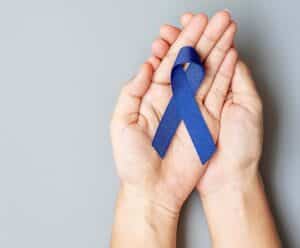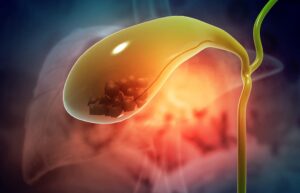Cincinnati GI Patient Newsletter – March 2023
March 2023
March is Colorectal Cancer Awareness Month
You might think you have plenty of time to schedule a colonoscopy, but this is what time can cost: The five-year survival rate of colorectal cancer is 64%. If caught early, it’s 91%.

Colorectal cancer develops slowly. There’s just a 24% chance that a pea-sized polyp will become cancerous in 20 years. So you think, “I have time.” But that delay can make the difference between living your normal life and undergoing cancer treatment. Such delays may be why colorectal cancer remains the second-deadliest cancer in the United States today.
And the timing matters now – March is Colorectal Cancer Awareness Month, when we think of the one in 25 people diagnosed in their lifetimes.
And the timing may matter to you sooner than you think. Colorectal cancer is striking people younger in life, which is why the American Cancer Society recommends those at even average risk get their first colonoscopies at 45, not 50. Are you a candidate? Read up about how easy the procedure can be, and common myths, here.
![]()
Why Healthy Eating is Good for Your Gut
Half of the U.S. population resolved to eat healthier in 2023, according to Statista. If you were one of them, how’s it going?

A key to healthier eating is to better understand the gut microbiome, which is in charge of how our diet affects our health. It does this through a vast collection of organisms – trillions of bacteria, viruses, and fungi – that serve as an internal assembly line, breaking down and sorting the nutrients passing through the intestines.
When you feed the microbiome with fruits, vegetables, fermented foods, and fiber, it’s happier. These foods support the microbiome’s population of “good” bacteria, which ensure regular digestion and overall health. The microbiome also contains potentially harmful bacteria, but the good bacteria can coexist peacefully with them – as long as balance is maintained.
If you feed the microbiome a diet heavy in processed meals, fried foods, red meat, and refined sugars, that balance can be thrown off and contribute to a wide range of health issues.
Read more here.
![]()
April is IBS Awareness Month
When it comes to irritable bowel syndrome (IBS), your worst fears don’t necessarily stem from what you know about it, but what you don’t know: when will an attack strike, how long it will last, what event will it disrupt?
This we do know: Up to 15% of people in the United States experience IBS, nearly twice as many women as men. If you regularly experience abdominal pain, bloating, diarrhea, and/or constipation, you may be living with IBS. If the effects of these symptoms interfere with your daily routine and produce anxiety, then it’s time to consult a doctor.
Here’s something you should know: April is IBS Awareness Month, and a wealth of resources is available to learn more about the condition and treatments. We’re among those resources. We can guide you through treatment options, including medications and mental health therapies.
You can be a resource, too. Raise awareness about IBS now, by sharing this blog on the topic, “Living with IBS: 6 Helpful Tips.” It may help someone important to you.
![]()
What Does the Gallbladder Do (Besides Make Stones)?
The gallbladder may be the least understood of all your body parts, but it sure knows how to make itself known.

Exhibit A: Those galling stones.
This painful ailment, which is diagnosed in nearly 1 million Americans a year, typically serves as the introduction to the otherwise unassuming organ. Our stomachs grumble and our hearts race, our bladders get full and our urethras regularly empty them out. But the tiny gallbladder (all 4 inches of it) goes about its daily business pretty quietly.
Unless an imbalance occurs.
That imbalance – of the substances inside the gallbladder – can lead to the development of gallstones, or common duct stones. You might think duct stones are an “I’ll worry about it when I need to” condition, but why not be prepared?
Learn more here.
If you are over age 45 (or younger with a family history of colon cancer) get out in front of this disease the smart way by scheduling your routine screening.
![]()
Patient Spotlight: Dave’s Story
“When my doctor told me my rectal bleeding was from hemorrhoids, I didn’t worry about it. I knew they weren’t life threatening. But a few years later when I had a colonoscopy, I learned it was more serious. Dr. Gregory Lam found several polyps, including a very large flat one that he later removed. The pathology was a tubulovillous adenoma, which is an advanced polyp. Dr. Lam told me that if it was left untreated, it likely would have become cancerous.
Of course, I’m really thankful for the outcome. I’m also thankful for the reminder that you have to take your health seriously. You need to eat right and take care of yourself. And get a second opinion if something doesn’t seem right.”
Read Dave’s full story here.



